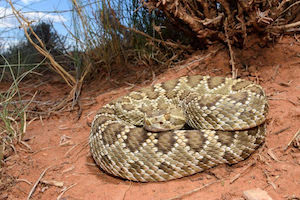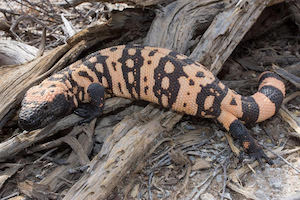What is the best pre-hospital treatment for a rattlesnake bite? Find out at unique symposium June 23-24
 Crotalus scutalatus, or Mojave rattlesnake. Photo Courtesy of William Wells, Chiricahua Desert MuseumRODEO, NM — When treating venomous bites from our local rattlesnakes, both in people and pets, the list of what not to do is longer than the list of what to do.
Crotalus scutalatus, or Mojave rattlesnake. Photo Courtesy of William Wells, Chiricahua Desert MuseumRODEO, NM — When treating venomous bites from our local rattlesnakes, both in people and pets, the list of what not to do is longer than the list of what to do.
Experts agree that three pre-hospital actions can save lives: 1) immediately seeking medical care or calling 911, 2) removing watches and jewelry, collars or reins, or anything else that restricts blood flow, and 3) keeping the affected area at the same level or above the heart.
When treating bites from rattlesnakes and other pitvipers, experts agree you should not apply suction, heat, pressure or turniquettes, and you definitely should not administer Benadryl, aspirin, steroids, or antibiotics. Electrical stimulation treatments (car batteries) don't work, and cutting into the bite can lead to infection and permanent tissue damage.
 Heloderma suspectum, or Gila monster. Photo Courtesy of William Wells, Chiricahua Desert MuseumMore than a dozen leading medical doctors, veterinarians, venomologists and other scientists, will discuss pre-hospital treatment of rattlesnake bites in Hidalgo County on Friday and Saturday, June 23 and 24 as part of the first-ever symposium, titled “Treatment of Pitviper Envenomation in the Rural Southwestern U.S.” The symposium, organized by Dr. Gordon W. Schuett, Dr. William K. Hayes, Bob Ashley, and Dr. Charles F. Smith, will be hosted by the Chiricahua Desert Museum in Rodeo, NM. The museum is a state-of-the-art private education and research facility.
Heloderma suspectum, or Gila monster. Photo Courtesy of William Wells, Chiricahua Desert MuseumMore than a dozen leading medical doctors, veterinarians, venomologists and other scientists, will discuss pre-hospital treatment of rattlesnake bites in Hidalgo County on Friday and Saturday, June 23 and 24 as part of the first-ever symposium, titled “Treatment of Pitviper Envenomation in the Rural Southwestern U.S.” The symposium, organized by Dr. Gordon W. Schuett, Dr. William K. Hayes, Bob Ashley, and Dr. Charles F. Smith, will be hosted by the Chiricahua Desert Museum in Rodeo, NM. The museum is a state-of-the-art private education and research facility.
The talks are aimed at helping anyone learn pre-hospital treatment for rattlesnake bites in humans, dogs, cats, horses, and other animals.
"This meeting will be especially helpful to medical personnel of the rural areas in this region, but we welcome anyone to attend, from ranchers and schoolteachers to students and daycare providers," said Gordon W. Schuett, the event's lead planner. He emphasized that "good information saves lives."
The four major venomous reptiles in our region that pose a risk to humans and pets are the western diamondback rattlesnake, Mojave rattlesnake, prairie rattlesnake, and Gila monsters.
"Antivenom can be costly, so budgeting for a venomous snakebite or getting pet insurance are good ideas for anyone who lives in areas where snakes are common," said Kimberly Wyatt, a doctoral student in herpetology and biology who will be presenting at the symposium. She is a member of the National Snakebite Support organization, which provides snake identification and treatment advice.
"Venomous snakebites are medical emergencies," Wyatt said, "and pets are more likely to suffer fatal outcomes than humans, especially if they don’t receive medical treatment. Antivenom is the only thing that can neutralize venom."
"It’s the sound you DO NOT want to hear: you’re on an evening walk in the wash and you let your dog off leash," says Dr Sarah Carotenuto, DVM, DABVP (CF). "He sticks his nose in a bush, yelps, and as he runs back, you hear that characteristic, gut-wrenching rattle and note two punctures on his muzzle, which start bleeding." Dr. Carotenuto teaches at the University of Arizona and will be a symposium presenter.
What actions you take next could mean the difference between life and death.
"There are some cases where treatment is necessary, but also a lot you can do in the meantime," Dr. Carotenuto says. "In general, the best outcome is seen with antivenom (94% of animals treated with antivenom survive to discharge, 90% survive overall, and around 10% will have a complication of some sort)."
The doctors and scientists who will be presenting at the include Daniel E. Keyler, Spencer C. Greene, Sarah Carotenuto, Nicklaus P. Brandehoff, Stephen P. Mackessy, Michael Cardwell, William K. Hayes, Jude T. McNally, Sean P. Bush, Craig W. Woods, Elda E. Sanchez, and Wyatt.The two-day event will take place at the comfortable, state-of-the-art Geronimo Event Center in Rodeo, New Mexico, affiliated with the Chiricahua Desert Museum. The museum features live rattlesnake exhibits, a large botanical garden, a campground, and an expansive gift shop and art gallery.
The symposium will have a banquet dinner and speaker on June 23. Overnight accommodations are available in Rodeo, Lordsburg, and Portal, Arizona. Cost to attend this symposium is $199, and $99 for spouses and students. Payment is due the day of the event at the museum. To register and reserve a spot, or to get more information, visit www.geronimoevent.com.


